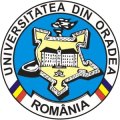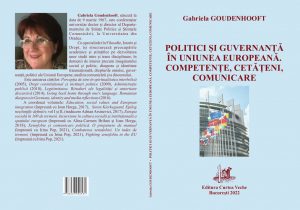Academic aim:
The aim of the course is to develop the understanding of the EU’s multilevel governance system, with a focus on the different actors (from different levels and sectors) and the process of influencing the EU decision-making in each of these levels, in order to prepare the students for participation in EU’s multilevel decision-making process, from the local to the European level, in accordance with their own specialization (BA) background.
Target group:
This course is addressed to the MA students from several programs from the Faculty of History, International Relations, Political Science and Communication Sciences.
Learning objectives:
- to familiarize the students with the main theoretical approaches on the EU’s multilevel governance, with a particular focus on: its openness to the mechanisms of participation and influencing the EU decision-making process; the role of the actors (from different levels and sectors) in this process; the formulation process of the European public policies;
- to familiarize the students with channels and instruments available for the actors (from different levels and sectors), for participation in the EU’s multilevel governance and for influencing the EU decision-making process;
- to enhance the students’ understanding of the features of the European, national, regional and local governance.
Structure of the course:
- The EU’s multilevel governance: concept, features, actors, challenges. The EU decision-making process, after the entry into force of the Treaty of Lisbon: EU institutions and bodies, EU inter-institutional relations, the European legal order.
- The formulation and implementation of the European public policies – between the European and national levels. Europeanization, competences, policy process, agenda-setting, the principles of subsidiarity and proportionality.
- The national and European citizenship: rights, obligations and participation. The representative and participative democracy in the EU. Towards an European, multilevel, active citizenship. The citizens: channels and instruments for influencing the EU decision-making process.
- The national, regional and local levels in the EU’s multilevel governance: public authorities – their place and role in influencing the EU decision-making process.
- The civil society’s organizations and the business enterprises – their place and role in influencing the EU decision-making process. Lobbying the EU institutions
- The traditional and new media, national and local – their role in the public opinion formation on the EU matters. The national and European public opinion – the degree of support for the EU’s and national institutions, policies and mechanisms.
- The European and national officials’ communication strategies on the EU matters.
Bibliography:
Books:
- Alexandru, Ioan, Drept administrativ european, București, Universul Juridic, 2008.
- Barston, R. P., Modern Diplomacy, Routledge, 2019.
- Bondar, Florin (coord.), Politici publice și administrație publică, Iași, Polirom, 2007.
- Brack, Nathalie, Coman, Ramona, Rittelmeyer, Yann – Sven și Stănculescu, Cristina, Despre Parlamentul European, democratizare și democrație, Iași, Editura Institutul European, 2011.
- Cerkez, Șerban, Grupurile de interese și politicile publice, Iași, Polirom, 2010.
- Fuerea, Augustin, Manualul Uniunii Europene, București, Universul Juridic, 2011.
- Hix, Simon, Noury, Abdul G. și Roland, Gerard, Politica democratică în Parlamentul European, Cluj – Napoca, CA Publishing, 2010.
- Iancu, Diana – Camelia, Uniunea Europeană și administrația publică, Iași, Polirom, 2010.
- Ion, Oana – Andreea, Guvernanța Uniunii Europene. Abordări actuale, Iași, Polirom, 2013.
- Ispas, Gabriel Liviu, Uniunea Europeană. Evoluție. Instituții. Mecanisme, București, Universul Juridic, 2012.
- Ivan, Adrian Liviu, Sub zodia „Statele Unite ale Europei”: de la ideea europeană, la Comunitățile Economice Europene, Cluj-Napoca, CA Publishing, 2009.
- Kjaer, Anne Mette, Guvernanța, Cluj-Napoca, CA Publishing, 2010.
- Luzarraga, Francisco Aldecoa și Llorente, Mercedes Guinea, Europa viitorului. Tratatul de la Lisabona, Iași, Polirom, 2011.
- Mihăileanu, Liviu și Horja, Aurelian, Reglementarea activității de lobby în anticamera influenței, București, Editura CH Beck, 2009.
- Rivett, Rosalie, Diplomatic Protocol: Etiquette, Statecraft & Trust, Whittles Publishing, 2018.
- Rusu, Ioana Eleonora și Gorning, Gilbert, Dreptul Uniunii Europene, București, Editura CH Beck, 2009.
- Sauron, Jean-Luc, Curs de instituții europene, Iași, Polirom, 2010.
- Sidjanski, Dusan, The Federal Future of Europe: From the European Community to the European Union, University of Michigan Press, 2000.
- Thakur, Ramesh, Cooper, Andrew, English, John, Enhancing Global Governance,. Toward a New Diplomacy, UNU Press, Tokyo, New York, Paris, 2002.
- Other up-to-date books.
Articles:
- Abromeit, Heidrun, “How to Democratise a Multi-level, Multi-dimensional Polity”, în Political Theory and the European Union. Legitimacy, Constitutional Choice and Citizenship. Albert Weale și Michael Nentwich (eds.), Taylor & Francis, 2005.
- Agger, Annika, „Towards Tailor-Made Participation: How to Involve Different Types of Citizens in Participatory Governance”, în Town Planning Review, Liverpool University Press (UK), vol. 83, nr. 1, 2012.
- Albert, Mathias, „Governance and Democracy in European Systems: on Systems Theory and European Integration”, în Review of International Studies, Cambridge University Press, nr. 28, 2002.
- Askola, Heli, “Tale of Two Citizenships? Citizenship, Migration and Care in the European Union”, în Social & Legal Studies, vol. 21, nr. 3, 2012.
- Atkinson, Rob, “The White Paper on European Governance: Implications for Urban Policy”, în European Planning Studies, vol. 10, nr. 6, 2002.
- Auberger, Tobias și Iszkowski, Krzysztof, “Democratic Theory and the European Union: Focusing on ‘Interest’ or ‘Reason’?”, în Journal of European Integration, vol. 29, nr. 3, 2007.
- Bache, Ian și Flinders, Matthew (eds.), Themes and Issues in Multi-Level Governance, Oxford, Oxford University Press, 2004.
- Beetz, Jan Pieter, „Stuck on the Rubicon? The Resonance of the Idea of Demoi-cracy in Media Debates on the EU’s Legitimacy”, în Journal of European Public Policy, vol. 22, nr. 1, 2015.
- Bellamy, Richard și Castiglione, Dario, „Legitimizing the Euro-polity and its Regime. The Normative Turn in EU Studies, în European Journal of Political Theory, vol. 2, nr. 1, 2003.
- Bellamy, Richard și Castiglione, Dario, „Democracy by Delegation? Who Represents Whom and How in European Governance?”, în Government and Opposition, vol. 46, nr. 1, 2011.
- Berg-Schlosser, Dirk, „The Quality of Democracies in Europe as Measured by Current Indicators of Democratization and Good Governance”, în Journal of Communist Studies and Transition Politics, vol. 20, nr.1, 2004.
- Bevir, Mark, “Democratic Governance: A Genealogy”, în Local Government Studies, vol. 37, nr. 1, 2011.
- Blom, Tannelie, Radulova, Elissaveta și Arnold, Christine, “Theorizing Modes of Governance in the EU: Institutional Design and Informational Complexity”, în European Governance Papers, nr. C-08-04, 2008.
- Böhme, Kai, Richardson, Tim, Dabinett, Gordon și Jensen, Ole B., „Values in a Vacuum? Towards an Integrated Multi‐level Analysis of the Governance of European Space”, în European Planning Studies, vol. 12, nr. 8, 2007.
- Borras, Susana și Radaelli, Claudio M., „The Politics of Governance Architectures: Creation, Change and Effects of the EU Lisbon Strategy”, în Journal of European Public Policy, vol. 18, nr. 4, 2011.
- Caporaso, James A. și Wittenbrinck, Joerg, „The New Modes of Governance and Political Authority in Europe”, în Journal of European Public Policy, vol. 13, nr. 4, 2006.
- Catney, Philip, “Democratic Dilemmas of Multilevel Governance: Legitimacy, Representation and Accountability in the European Union”, în West European Politics, vol. 31, nr. 5, 2008.
- Cheneval, Francis, Lavenex, Sandra și Schimmelfennig, Frank, “Demoi-cracy in the European Union: Principles, Institutions, Policies”, în Journal of European Public Policy, vol. 22, nr. 1, 2015.
- Deakin Crick, Ruth, „Key Competencies for Education in a European Context: Narratives of Accountability or Care”, în European Journal of Educational Research, vol. 7, nr. 3, 2008.
- Delanty, Gerard, “European Citizenship: A Critical Assessment”, în Citizenship Studies, vol. 11, nr. 1, 2007.
- Eising, Rainier, „The Access of Business Interests to EU Institutions: Towards Elite Pluralism?”, în Journal of European Public Policy, vol. 14, nr. 3, 2007.
- Eriksen, Erik Oddvar, „An Emerging European Public Sphere”, în European Journal of Social Theory, vol. 8, nr. 3, 2005.
- Guy Peters, Brainard, “Forms of Informality: Identifying Informal Governance in the European Union”, în Perspectives on European Politics and Society, vol. 7, nr. 1, 2006.
- Hazenberg, Haye, „Is Governance Democratic?”, în Critical Review of International Social and Political Philosophy, 2013.
- Heidbreder, Eva G., “Governance in the European Union: A Policy Analysis of the Attempts to Raise Legitimacy through Civil Society Participation”, în Journal of Comparative Policy Analysis: Research and Practice, 2014.
- Jachtenfuchs, Markus, „The Governance Approach to European Integration”, în Journal of Common Market Studies, vol. 39, nr. 12, iunie 2001.
- Kohler – Koch, Beate și Finke, Barbara, “The Institutional Shaping of EU – Society Relations: A contribution to Democracy via Participation?”, în Journal of Civil Society, vol. 3, nr. 3, 2007.
- Michalowitz, Irina,” What Determines Influence? Assessing Conditions for Decision-Making Influence of Interest Groups in the EU”, în Journal of European Public Policy, vol. 14, nr. 1, 2007.
- Nicolaïdis, Kalypso, „European Demoicracy and its Crisis”, în Journal of Common Market Studies, vol. 51, nr. 2, 2013.
- Papadopoulos, Yannis, “Accountability and Multi-Level Governance: More Accountability, Less Democracy?”, în West European Politics, vol. 33, nr. 5, 2010.
- Potluka, Oto și Liddle, Joyce, “Managing European Union Structural Funds: Using a Multilevel Governance Framework to Examine the Application of the Partnership Principle at the Project Level”, în Regional Studies, vol. 48, nr. 8, 2014.
- Other up-to-date articles.







